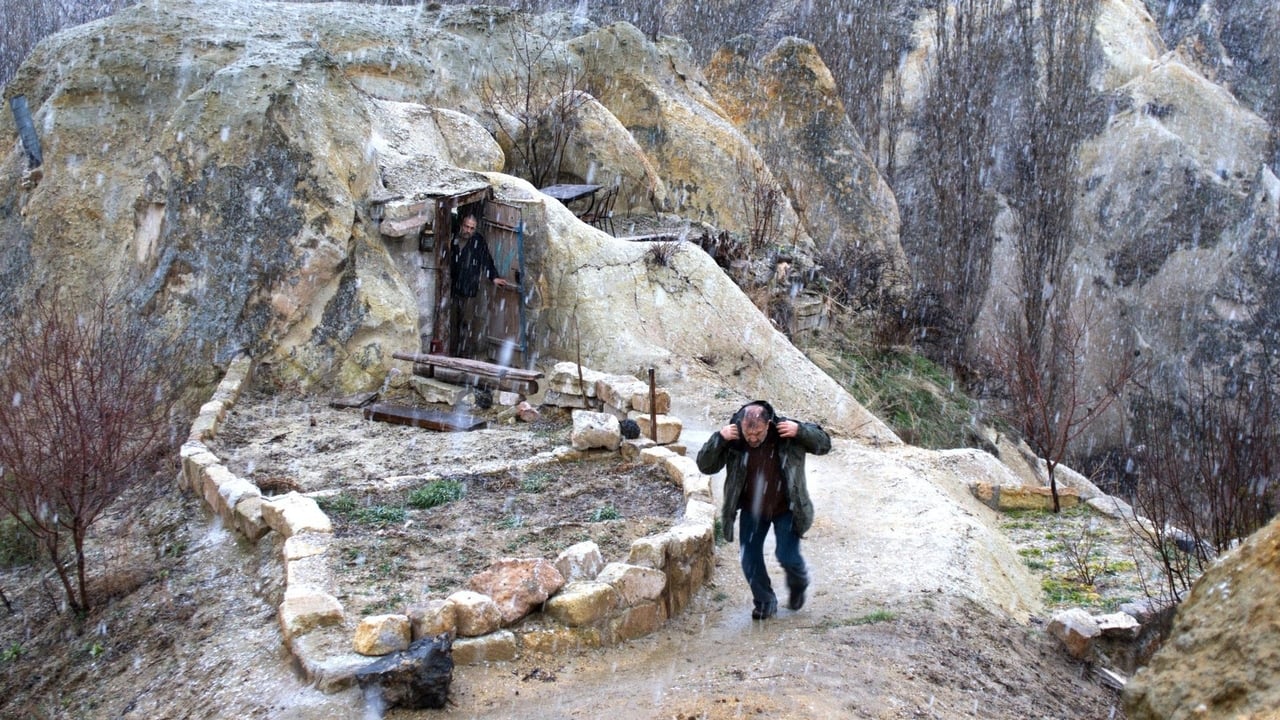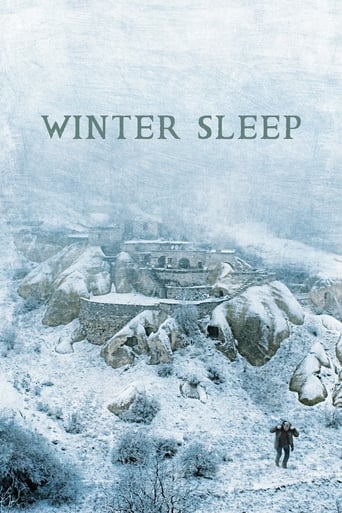lasttimeisaw
A wisp of smoke pluming from the tussock, this is the opening shot of Nuri Bilge Ceylan's Palme d'or winning tome WINTER SLEEP, and it impeccably recapitulates what Ceylan angles to reify: the cosmically intangible yet intrinsically tangible incapability of communication among us humans. Our protagonist is the salt-and-pepper, middle-aged Aydin (Bilginer), a quondam thespian (a term which he prefers than "actor"), who runs a mountaintop hotel called "Othello" in Cappadocia of the Central Anatolia. For those who are au fait with Ceylan's track record and artistic felicity, it comes as an invigorating surprise to see a concise-to-wordy volte-face here, as this 196-minutes saga is chiefly composed of long-winded conversation segments (with no embellishment of accompaniments to boot), only intermediately larded with its ongoing actions and the sublime, postcard-ready shots of the magnificent topography of the locale, which is able to rouse even the most torpid wanderlust out of hibernation, Ceylan assures us its natural beauty is unadulterated and the film would land on its feet eventually through its dramaturgic toil. With winter looming around, the hotel business is in its troughs, but Aydin's sedate life is slowly descending into a personal quagmire due to both in-house and extraneous forces. The crisis within is the irreconcilable rift between him and his closest kin, namely his divorced sister Necla (Akbag, coalescing a languid easiness with sharp-edged spite) and his wife Nihal (Sözan), who is only half of his age. Their first debate is about Necla's "not resisting evil" supposition, an airy-fairy notion completely throws oneself on the mercy of other's quarter, before soon it exacerbates into many a personal snide, between Necla and Nihal firstly, then a protracted sibling verbal sparring adding insult to injury, from introspectively dialectical to deliberately catty, Ceylan hits home with his onion-peeling relentlessness to censure a detrimental propensity among intelligentsia: constantly attempting to earn one-upmanship by thinly-veiled denigration. Apparently, Aydin wins this round and Necla willfully takes her bow and never returns thenceforth. The meat of Aydin and Nihal's nuptial rub comes to the fore later, starkly chaste, their relationship has already been on the rocks for years, Nihal tries to ease her "trophy wife" shame by plunging into a fund-raising business for schools and children, refusing Aydin's interference of any kind, apart from accepting his anonymous charity from time to time. She cannot bear his non- threatening but chronically encroaching superciliousness, yet has no moxie to put the kibosh on their marriage in gridlock. As for Aydin, he sees all too well of Nihal's fix and cunningly barters his subservience for her entrapment "I love you, and I know you don't love me, but you cannot get your cake and eat it too!", that is the connotation. The cruel manifestation of selfish love from those who are endowed with clout and money. And later in a conversation with a local teacher Levent (Saribacak, exemplifies cogently how to shoot the booze-emboldened sideswipes), which goes argumentative, Aydin seemingly has the final say with a caustic rejoinder but the subsequent spewing betrays that an inward damage is done.Outwardly, it is the gap between castes that writs large and cannot be mediated, the family of Aydin's hard-up tenants, brothers Hamdi (Kiliç) and Ismail (Isler) cannot pay their rent on time and the ensuing dispute becomes rather ugly, and when a broken car window impels Hamdi to humble himself in front of a condescending Aydin, the Janus-faced reality seeps into the scenario in both castes, from smile to curse, from bonhomie to grumbling, all in a trice, even Aydin's chauffeur/assistant Hidayet (Pekcan), who is not above to hector those less fortunate tenants, but meanwhile has to carry all his master's luggage in a snowfall day, with the latter wandering with idle hands, so it is not surprising to see him one minute ago promise to keep a secret at the behest of Aydin and the next minute, casually divulges it to another party on the phone, the well-adjusted equilibrium between obedience and defiance is all too close to home.Indubitably, WINTER SLEEP is first and foremost, an actor's showpiece, leading actor Haluk Bilginer competently hammers out his delivery on the strength of his word-wielding expertise and telegraphs Aydin's inscrutable train of thought when lines are not proffered. Melisa Sözen, on the other hand, brilliantly portrays a more emotionally readable persona and her best scenes are in the cathartic episode, when Nihal tries to use money to buy her conscience in front of a seething Nejat Isler (emotive with a commensurate restraint, upstaging the rest in his two scenes), and the story reaches its apogee, but in post-mortem, it is a missing opportunity that Ceylon doesn't apply his "not resisting evil" theory for a trial run here, which in return points up Ceylon's own guarded and idealized stance of the have-nots: they are willing to die for dignity, the only remnant left for them to weaponize. An illuminating stew of the perennial vagaries (religion, philosophy, morality and class stratification, etc.) obstructing our day-to-day communications, WINTER SLEEP mark's Ceylon's highest achievement so far for his profound perspective in fleshing out a conundrum that is elementally complex and sophisticatedly widespread.
petra_ste
A dark, non-pithy version of Polanski's Carnage, this character study focuses on a wealthy, aging intellectual (Haluk Bilginer), who owns an isolated hotel where he lives with his young wife (Melisa Sözen) and divorced sister (Demet Akbag). With the arrival of a snowy winter, the relationships between the three deteriorate to a disturbing extent.There is little physical violence in the movie (a slap in the face and an animal shot dead), but the amount of psychological conflict is unsettling. Superb performances and a sharp script make the increasingly venomous confrontations between characters riveting.Once again, writer/director Nuri Bilge Ceylan borrows from great Russian literature: a tense sequence with an envelope full of money is a possible homage to a famous scene in The Idiot, and I counted at least three short tales by Anton Chekhov which inspired various plot developments (A Nightmare, The Wife, Excellent People). 8/10
Frank Dudley Berry, Jr.
There is no gainsaying that this is an incredibly beautiful movie, or that the dialog is well written. The problem is that there is much, too much of it. Comparisons to Shakespeare overlook the fact that Shakespeare is a marvel of economy - and also that he wrote action plays, by and large. Each of the dialogs is well-written - but there are too many of them. And with all the talk, some important points of character are never resolved. The central character is Aydin, a retired actor and heir to a number of rental estates in Anatolia. His wife is decades younger. How did they meet? How did the unlikely marriage take place? What did she want or expect? Etc.None of this is addressed - instead everything is expressed in present tense. No one except Necla (Aydin's sister) has a personal history, and even that is only partially described. But all of this is actually pretty important to understanding how they came to where they are.I don't mind pictures in which nothing much happens, which is certainly this one. I do have a problem with movies that seem premised on the notion that simple artiness is sufficient. It isn't.Finally, the incredibly dull musical score consists of various piano selections from the romantic masters - sort of like that Bergman picture in which the only music was a Bach unaccompanied cello suite. That tells you all you need to know.

